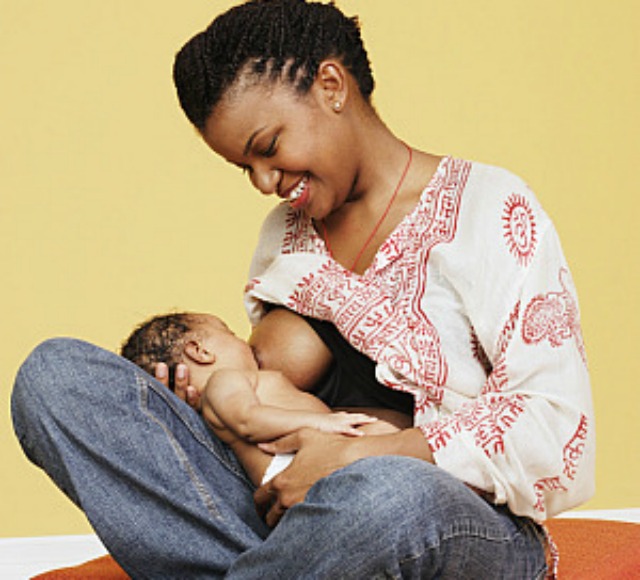 I pride myself on being a black, queer Jewish doula, but does that mean I'm the right doula for someone who, say, identifies as a white, heterosexual Christian? Yes, maybe.
According to an article about Black Midwives in the LA area, "Nationwide, black women are at the greatest risk of pregnancy-related death, have the highest rates of C-sectionsand, compared with whites, black infants are four times as likely to die of complications at birth and twice as likely to die before their first birthday." This disparity in maternal care along racial lines is something that can't be ignored. When a woman of color in the hospital birthing system is possibly surrounded by doctors and nurses who don't look like her, having a black doula to help her advocate for herself can be the difference between a natural birth and an emergency c-section. I want to be clear that this isn't to say that a white doula couldn't provide a woman of color care that is just as comprehensive and caring, it's just different. A black doula shares a similar life experience as her black client, even if they come from two separate worlds. So what about religion? Is it important that my doula matches my personal religion? Again, I can't say, though I've personally doulaed for couples who shared my religious background and those who did not. For some, the religious/spiritual aspect of birth is important. It can mark a new life cycle event that requires special prayers or affirmations be recited. Having a doula who is familiar with those rituals can be helpful. For others, birth is just a part of life that doesn't hold any specific religious significants, but has a spiritual element that a doula can help facilitate. Mother blessings, placenta burying, and similar are all rituals that a doula can help plan. Lastly, what about sexual orientation. Would it be weird to have a lesbian doula at my birth if I'm not a lesbian myself? Again, I can't answer this question for anyone. However, I will say that all of my clients to date have been straight couples or single women and it hasn't been an issue. Like race and religion, having a doula who understands differing pronouns, gender presentation, language, and processes can be helpful for couples and singles in a hospital setting, where awareness and sensitivity may be limited. So what does this all mean? Should I only accept clients who are like me? No, not at all. I love that my client base has been an incredibly diverse mix of single women, couples, friends and strangers. I love that I've been able to whisper tehillim (Psalms) while a woman labors and mimic "Thank you, Jesus" when an exhausted mother holds her baby for the first time. I always encourage clients that I meet for consultation to interview at least two (or more) doulas to find the one that "fits". And if the one that fits happens to be similar to you, great. If the doula does not, well, that's great too.
0 Comments
 One of the things I often hear is that doulas cost a lot of money. And I get it. When you see a one-time, often up-front price ranging from hundreds to thousands of dollars, it can be intimidating. Add to that the fluctuation of prices from doula to doula, and the process can become overwhelming. So why are we so expensive? Truthfully, we're not. I say that as a person who would gasp (okay, maybe faint) whilst forking over a thousand dollars (or more) for a doula when my time comes. So where does your doula fee go? Experience and Training Most parents who are looking to hire a doula start with where she was trained as well as how much experience she has. Doulas who have been through multiple trainings and have attended a great deal of births tend to charge more for their experience. But, that's not to say that a doula who has only attended a few births doesn't also charge "market price" for her services. While most of the money we earn for births goes towards logistics (more on that later), a chunk of it (at least for me) goes towards advanced training. This ultimately makes for better doulas. The average cost of doula training is about $600, though I have seen it higher for week-long retreat-style trainings. Postpartum training can also range between $600-900. If you want to become a Certified Lactation Consultant, trainings can be as much as $900, and if you'd like to take it further to become an Internationally Board Certified Lactation Consultant, testing costs money as well. Becoming certified in Placenta Encapsulation, Child Birth Education, and Essential Oils and Herbs are trainings that most doulas want to add to their business. We earn these certifications and attend trainings based on our income. Logistics Most doulas go on 24/7 call at least two weeks, but sometimes as early as a month before the time of a client's Estimated Due Date. This means they are essentially "on the clock" 24 hours a day. If I divided my current doula fee* of $850 by two weeks, I would average about $2.52 an hour without counting the amount of time doulas spend with their clients during their birth. Like most doulas, when a client calls me for their birth, I stay by their side until 2 hours after the baby is born and the parents are settled. This also means that we are not taking new clients. We are usually not going on initial consultations or meetings because we could be called to a birth at any moment. We are committed to our clients. Gas, Food, Etc. Doulas pay for their own gas or fare for public transportation to all consultations and prenatal visits. We also make postnatal visits (up to 2, or 3 in some cases) without charging a "postpartum doula fee." While we don't get lunch breaks, we do pay for our food, water, and supplies that we bring to each birth. This can range from books we loan to clients to birthing balls, rebozos, etc. Personal Sacrifice When a doula goes on call, she/he does so with the knowledge that at any time we could be called for a birth. This means we miss family time, vacations and trips, or nice dinners with our significant others. And when the time comes for baby to be born, we leave our full time jobs (if we work outside of doula-ing), family, and children for an undefined amount of time. Is it Worth it? I can't say that for anyone (typical doula answer). The evidence shows that having a doula-attended birth results in less intervention, fewer cases of unplanned c-section, better management of labor pains, shorter labors, and healthier breastfeeding relationships. Like most doulas, I'm not in it for the money. I do what I do because I'm passionate about it. I love helping people become parents. There is still nothing more awe-inspiring than watching a baby be born. I get a rush from the sheer power and determination of women in labor and nothing beats the smell of amniotic fluid clinging to your clothes. The oxytocin that baby and new parent emit is intoxicating and contagious. I always tell parents that I interview with that they should pick a doula not by how much she costs, or her experience, but by how you feel when you are in her presence. And to my mind, that presence is priceless.  Image from newsone.com Image from newsone.com The microbial population living in breast milk and the transport of bacteria between mother and child play a crucial role in regulating health. With no more intimate moment between a mother and child, breastfeeding provides nutritional, immunological and emotional nurturing. However, recent discoveries have revealed an even deeper connection that suggests breastfeeding is far more precious than we first thought. The secret lies within microbial populations living in breast milk. Whilst bacteria hardly sound like an enticing gift, the transfer of a mother’s microbial inhabitants appear to be the most valuable gift a mother can provide to her child. Definitely not sterileNot so long ago, it was thought that breast milk was completely sterile. Any sign of bacteria was attributed to the presence of infection in the breast, such as mastitis, or to contamination by skin flora. However, advances in understanding of the vast microbial populations that live within our body, dubbed the ‘human microbiome’, paint a completely different picture. Healthy breast milk has been found to be crawling with bacteria.DNA sequencing technology is now identifying 400 species living in the breast with many more likely to be accompanying them. To make things even more complicated, they are constantly changing over time with measured shifts in microbial presence between pre- and postnatal samples, as well as between months 1-6 of breastfeeding. A mother’s inner highwayFor a newborn, the first encounter with bacteria occurs with the placenta. Then, natural vaginal birth is designed to provide a ‘starter pack’ of microbes for the child. The mother’s body doesn’t stop there: it will prepare a rich and diverse microbial population to be delivered during breastfeeding. Bacteria, as it turns out, seem to be traveling from the mother’s gut to her breast milk. New and exciting research is showing how the immune system moderates this process in the stomach by selecting microbes to transport to the breast via the lymphatic system. Like a microscopic highway, studies have also shown that breastfeeding women given a capsule of bacteria to swallow can later have the very same species isolated from their breast milk. A fascinating picture of how a mother cherry picks microbes from the outside world to give to her infant. Continue Reading on BreastfeedingToday |
Details
AuthorHi there! I'm Erika Davis and I'm a doula working in the Seattle and South Puget Sound area. Archives
December 2018
Categories
All
|
 RSS Feed
RSS Feed